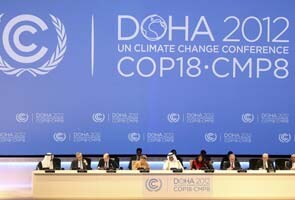
A row over who will pay for dealing with the accelerating impact of climate change soured UN debate in Doha, where a final day of haggling was expected to do nothing to curb greenhouse gas pollution.
The two-week talks are meant to end on Friday, under the leadership of the Middle Eastern oil-and-gas power Qatar, which has the world's highest per-capita emissions.
UN climate conferences, bringing together nearly 200 nations, are notorious for missing deadlines - a lack of urgency in stark contrast to mounting scientific evidence that global warming is worsening.
Many attending the Doha talks said 4 degrees Celsius of global warming looked almost inevitable and the opportunity to limit the temperature rise to the 2 degrees scientists say would prevent the worst consequences is all but lost.
"The question of climate management is extremely serious," Laurent Fabius, France's foreign minister, told reporters.
"It appears we have already exceeded the 2-degree limit. If that is the case, there are absolutely catastrophic consequences. We must react."
Tackling climate change was "the new challenge in world diplomacy," he said.
No money, no pledges
Host nation Qatar was among the many nations to disappoint by failing to make any pledges on reducing emissions or on delivering climate cash to help the poorest nations adapt.
One of the world's richest nations, so far Qatar has only said it was setting up a research centre to analyse the impact of global warming.
European Union nations made some offers of funding.
They were not enough, however, to satisfy demands by the developing world for a timetable for a promised tenfold increase in aid to reach $100 billion a year by 2020.
National pledges by Germany, Britain, France, the Netherlands, Sweden, Denmark and the EU Commission in Doha totalled more than 6.85 billion euros for the next two years - more than in 2011-12.
World greenhouse gas emissions are set to rise 2.6 percent this year.
But only a handful of countries - Lebanon, the Dominican Republic, Belarus and Ukraine - set new goals for curbing greenhouse gas emissions during the Doha meeting.
From the start, the Doha talks had low ambitions, so failure would be less spectacular than at a UN summit in 2009 when world leaders including US President Barack Obama fell short of a new, global package to combat climate change.
Last year's climate talks in Durban, South Africa, managed what many viewed as a landmark deal to keep alive the Kyoto process.
It set a deadline of 2015 to get a new legal deal in place, removing some of the pressure from the Doha talks, just ahead of the end of the first Kyoto commitment period, which runs out at the end of the month.
That means the next crucial climate summit will be in 2015 when France is expected to be the host.
To try to spur progress before then, UN Secretary-General Ban Ki-moon has announced a special high-level meeting in 2014.
The two-week talks are meant to end on Friday, under the leadership of the Middle Eastern oil-and-gas power Qatar, which has the world's highest per-capita emissions.
UN climate conferences, bringing together nearly 200 nations, are notorious for missing deadlines - a lack of urgency in stark contrast to mounting scientific evidence that global warming is worsening.
Many attending the Doha talks said 4 degrees Celsius of global warming looked almost inevitable and the opportunity to limit the temperature rise to the 2 degrees scientists say would prevent the worst consequences is all but lost.
"The question of climate management is extremely serious," Laurent Fabius, France's foreign minister, told reporters.
"It appears we have already exceeded the 2-degree limit. If that is the case, there are absolutely catastrophic consequences. We must react."
Tackling climate change was "the new challenge in world diplomacy," he said.
No money, no pledges
Host nation Qatar was among the many nations to disappoint by failing to make any pledges on reducing emissions or on delivering climate cash to help the poorest nations adapt.
One of the world's richest nations, so far Qatar has only said it was setting up a research centre to analyse the impact of global warming.
European Union nations made some offers of funding.
They were not enough, however, to satisfy demands by the developing world for a timetable for a promised tenfold increase in aid to reach $100 billion a year by 2020.
National pledges by Germany, Britain, France, the Netherlands, Sweden, Denmark and the EU Commission in Doha totalled more than 6.85 billion euros for the next two years - more than in 2011-12.
World greenhouse gas emissions are set to rise 2.6 percent this year.
But only a handful of countries - Lebanon, the Dominican Republic, Belarus and Ukraine - set new goals for curbing greenhouse gas emissions during the Doha meeting.
From the start, the Doha talks had low ambitions, so failure would be less spectacular than at a UN summit in 2009 when world leaders including US President Barack Obama fell short of a new, global package to combat climate change.
Last year's climate talks in Durban, South Africa, managed what many viewed as a landmark deal to keep alive the Kyoto process.
It set a deadline of 2015 to get a new legal deal in place, removing some of the pressure from the Doha talks, just ahead of the end of the first Kyoto commitment period, which runs out at the end of the month.
That means the next crucial climate summit will be in 2015 when France is expected to be the host.
To try to spur progress before then, UN Secretary-General Ban Ki-moon has announced a special high-level meeting in 2014.
© Thomson Reuters 2012
Track Latest News Live on NDTV.com and get news updates from India and around the world

